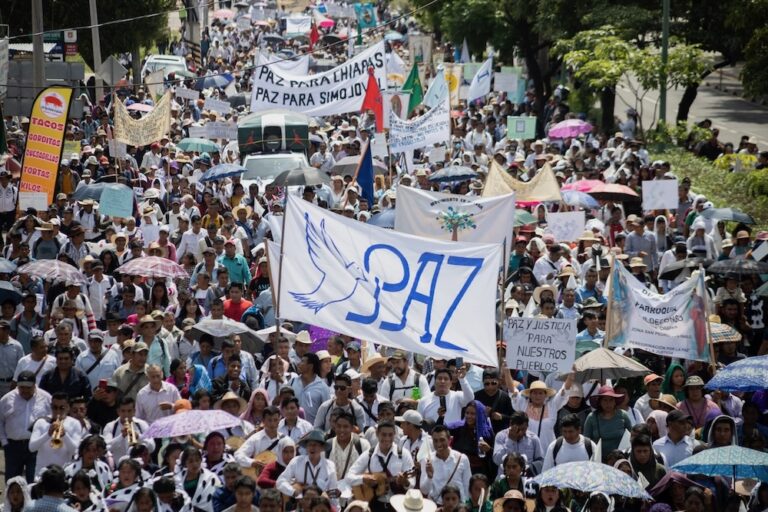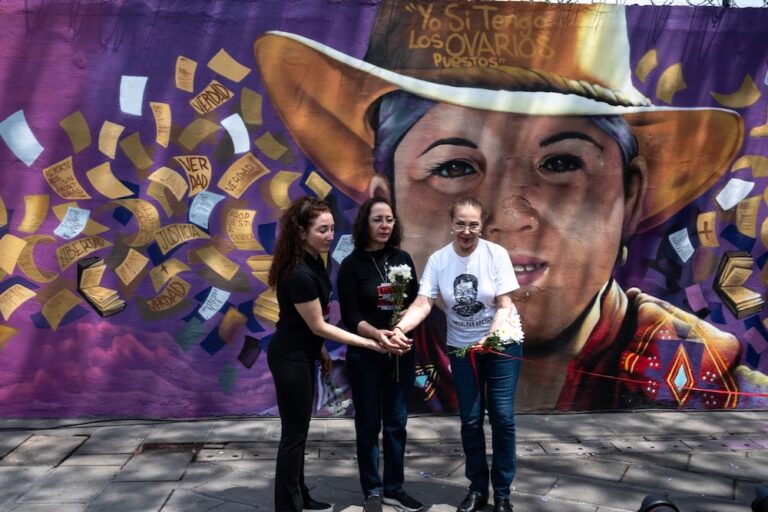(RSF/IFEX) – In a letter to Interior Minister Santiago Creel Miranda, RSF protested the fact that shots were fired at the offices of the weekly “Páginas” en Tuxtla Gutiérrez (Chiapas) and that about ten journalists in the states of México and Morelos (in the country’s south) were detained and threatened. RSF Secretary General Robert Ménard […]
(RSF/IFEX) – In a letter to Interior Minister Santiago Creel Miranda, RSF protested the fact that shots were fired at the offices of the weekly “Páginas” en Tuxtla Gutiérrez (Chiapas) and that about ten journalists in the states of México and Morelos (in the country’s south) were detained and threatened. RSF Secretary General Robert Ménard condemned “the increase in attacks, detentions and threats against journalists.” The organisation asked for an investigation into each of the cases and noted that agents of the state may be implicated.
RSF also asked Creel Miranda to put an end to journalists’ detentions. In a document approved in January 2000, the United Nations special rapporteur on the promotion and protection of the right to freedom of opinion and expression said that “imprisonment as punishment for the peaceful expression of an opinion constitutes a serious violation of human rights.”
According to the information collected by RSF, on 3 April 2002, assailants fired shots at the offices of the weekly “Páginas”, published in the city of Tuxtla Gutiérrez in Chiapas and threatened the newspaper’s employees. A complaint was filed by the newspaper’s management. The management said that the attack may be linked to “Páginas”‘ criticisms of the authorities and stressed that acts of intimidation, threats and violence by the Chiapas authorities against journalists have multiplied in recent months. On 7 March, Fredy Martín Pérez Lopez, a correspondent for the daily “El Universal” and the Italian news agency ANSA, was attacked by police officers in San Cristobal de las Casas, as he was observing a confrontation between the police and indigenous people.
On 1 April, Raquel Urbán Hernández, of the weekly “Reporteros Informando”, published in the city of Ecatepec, state of Mexico, was arrested. She was released the same day after paying bail of 22,000 pesos (approx. US$2,420, 2,800 euros). She was arrested after a “defamation” action launched against her in January by Alejandro Gamiño Palacios, legislator for the governing party, Partido de Accion Nacional (PAN). On 26 November 2001, Urbán Hernández had criticised the legislator for his alleged implication in the rape of a minor.
On 11 March, María Esther Martínez, of the daily “La Union de Morelos”, published in the state of Morelos, was arrested in the city of Xochitepec. According to the Morelos Independent Human Rights Commission, a non-governmental human rights organisation, the journalist, who is facing charges for “defamation”, was arrested after having criticised the Morelos Attorney General’s Office and the Ministerial Police. She was released the same day. On 14 March, Jesús Castillo, of the same daily, received threatening telephone calls after having reported on the alleged links of some police officers with drug traffickers and kidnappers. On 27 February, Sergio Gomez Guerra, also of “La Union de Morelos”, was arrested and charged with “trafficking in stolen vehicles”. The incident occurred one week after the publication of an article with Gomez Guerra’s byline revealing alleged links between an individual close to the chief of the Ministerial Police and a group of kidnappers arrested in the state of México. Gomez Guerra was released after three days.
In 2001, Roberto Díaz Guerrero and Fernando Ojeda, of the Televisa television network, and Angélina Albarrán, of “Diario de Morelos” and the Tiempo A.M. radio station, received threats. On 19 November, RSF protested against the pressure exerted on Francisco Guerrero, director of the state of Morelos edition of “La Jornada”. Guerrero had accused an official of the Justice Ministry of being implicated in an assassination. He had also criticised the alleged existence of a group within the government of Morelos in charge of watching members of opposition parties and non-governmental organisations (see IFEX alert of 21 November 2001).


